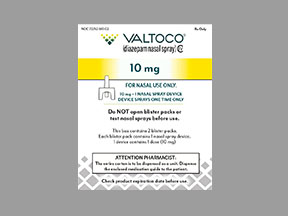
Valtoco 10 Mg Dose Coupons & Savings Card – Discount Prices from $1848.32
My prescription
Edit
10MG/0.1ML, Valtoco 10 Mg Dose (5 Liquids)
Select pharmacy

CVS
$1943.78
COUPON PRICE
Albertsons
$1848.32
COUPON PRICE
Walgreens
$1901.60
COUPON PRICE
Walmart
$1965.68
COUPON PRICEValtoco 10 Mg Dose savings card
Show this card to your pharmacist
Albertsons
$1848.32
BIN
ID
PCN
GRP
019876
LHD422763F
CHIPPO
LHX
Powered by
More prescriptions for spasticity
More prescriptions for spasticity
Price history for Valtoco 10 Mg Dose
5 Liquids, 10MG/0.1ML
Average retail price for Valtoco 10 Mg Dose
Average SaveHealth price for Valtoco 10 Mg Dose
Our price history data is based on aggregated prescription data collected from participating pharmacies in America. Our prescription data updates daily to reflect the latest price changes. If you notice a missing data point, it means there wasn't sufficient data available to generate a monetary value for that date.
*Retail prices are based on pharmacy claims data, and may not be accurate when we don't have enough claims.
Valtoco 10 Mg Dose dosage forms
Dosage Quantity Price from Per unit 10MG/0.1ML 5 Liquids $1848.32 $369.66 10MG/0.1ML 2 Liquids $748.33 $374.17
| Dosage | Quantity | Price from | Per unit |
|---|---|---|---|
| 10MG/0.1ML | 5 Liquids | $1848.32 | $369.66 |
| 10MG/0.1ML | 2 Liquids | $748.33 | $374.17 |
Using the SaveHealth discount card, what is the price of Valtoco 10 Mg Dose without insurance?
Using the SaveHealth discount card, the price of Valtoco 10 Mg Dose without insurance is $1848.32.
What is the price of Valtoco 10 Mg Dose at CVS?
The price of Valtoco 10 Mg Dose at CVS is $1943.78.
What is the price of Valtoco 10 Mg Dose at Walgreens?
The price of Valtoco 10 Mg Dose at Walgreens is $1901.60.
What is the price of Valtoco 10 Mg Dose at Walmart?
The price of Valtoco 10 Mg Dose at Walmart is $1965.68.
